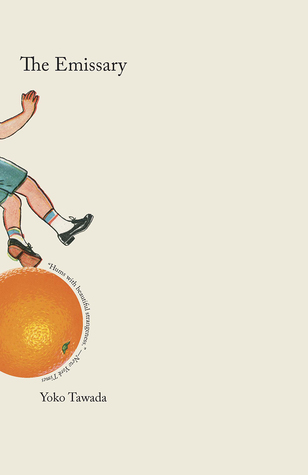
The Emissary
کتاب های مرتبط
- اطلاعات
- نقد و بررسی
- دیدگاه کاربران
نقد و بررسی

January 29, 2018
An anxious writer frets over his wastrel of a great-grandson in this inventive dystopian novel from Tawada (Memoirs of a Polar Bear). Its environment “irreversibly contaminated,” near-future Japan has been cut off from the outside world, leaving 108-year-old Yoshiro trapped with his great-grandson Mumei in a spartan “temporary” house. The population is divided between those born before the calamity—whose life spans have been mysteriously lengthened—and those enfeebled by it: “The aged could not die; along with the gift of everlasting life, they were burdened with the terrible task of watching their great-grandchildren die.” Yoshiro dreams of escape, but it is Mumei who, despite his inability to walk or chew properly, is selected as one of several “especially bright children to send abroad as emissaries.” Mumei’s deteriorating condition is signalled by his hair turning grey, and soon he begins having difficulty breathing. These health problems complicate his potential deployment; while he awaits a decision, he turns to the more urgent task of comforting Yoshiro. Tawada’s novel is infused with the anxieties of a “society changing at the speed of pebbles rolling down a steep hill,” yet she imagines a ruined world with humor and grace.

January 1, 2018
Japanese-born, Germany-based Tawada (Memoirs of a Polar Bear) writes facilely in both languages and creates incomparable award-winning fiction that defies easy labels. Tawada's latest in translation (smoothly rendered by Mitsutani, who also translated one of Tawada's earliest works, the three-storied The Bridegroom Was a Dog) introduces a symbiotically bonded duo who are a century apart in age. At almost 108, Yoshiro still jogs every morning for half an hour--with a rented dog. His reason for (still) living is Mumei, his daughter's son's son--to get him up, dressed, mandarin-juiced, out the door to practice walking a few steps, then biked the rest of the way to his elementary school. In this alternate future, everything--soil, sky, oceans--is potentially poisoned, most animals have disappeared, and even the children face extinction. Only the elderly seems to have long, long life--perhaps more curse than blessing as they bear the responsibility for being guardians to fragile, weakened new generations unprepared for survival. And yet despite his seemingly truncated prognosis, Mumei's outlook remains full of insight and charm. VERDICT Blending fairy tale, dystopian warning, peculiar mystery, cultural critique, and multigenerational family saga, Tawada's latest literary, linguistic melange should satiate even the most discerning international fiction aficionados.--Terry Hong, Smithsonian BookDragon, Washington, DC
Copyright 2018 Library Journal, LLC Used with permission.

February 15, 2018
In this slim, impactful novel, surrealist master Tawada (Memoirs of a Polar Bear, 2016, etc.) imagines a dystopian Japan reckoning with its own identity.In the wake of an economic and environmental tragedy that eerily echoes 2011's Fukushima Dai-ichi nuclear disaster, the Japanese government implements an "isolation policy," cutting the country off from the outside world. Central Tokyo is deserted, the country's soil is contaminated, its plants have mutated, and its people are living under a capricious governing body that has not only waged a war on words (the term "mutation" having been replaced by the more agreeable "environmental adaptation"), but has proven to have a penchant for tinkering with the laws: "Afraid of getting burned by laws they couldn't see, everyone kept their intuition honed as sharp as a knife, practicing restraint and self-censorship on a daily basis." A writer unsettled by the turn his country has taken, Yoshiro's main concern is the declining health of his grandson, Mumei. In this new era, children are wise beyond their years, but their bodies are brittle, aging vessels, and the elderly have become a new kind of species, cursed with the gift of everlasting life, "burdened with the terrible task of watching their great-grandchildren die." Left in Yoshiro's care after the death of his mother and disappearance of his father, Mumei, feeble (and toothless) as he is, fills his grandfather's interminable days with life. Despite the gloomy circumstances, Tawada's narrative remains incandescent as she charts the hopeful paths both grandfather and grandson embark upon in their attempt to overcome mortality's grim restraints. Striving to persist in a time when intolerance abounds and "the shelf life of words [is] getting shorter all the time," Mumei's searching curiosity and wonder toward the world inspire faith that, even in the darkest of days, humanity cannot be forsaken.An ebullient meditation on language and time that feels strikingly significant in the present moment.
COPYRIGHT(2018) Kirkus Reviews, ALL RIGHTS RESERVED.

























دیدگاه کاربران